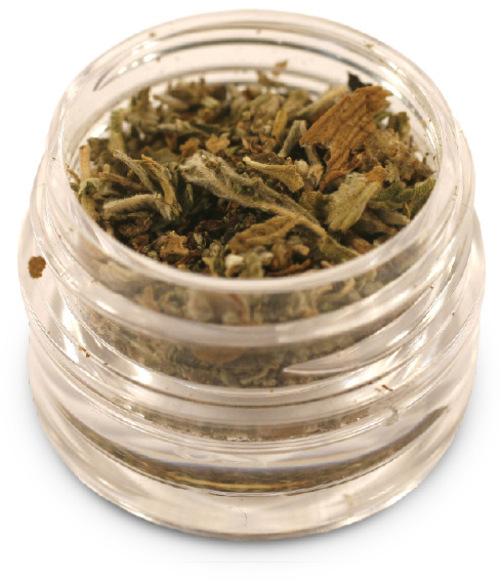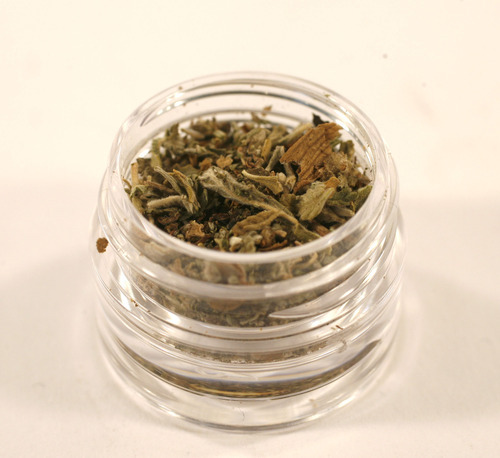This is an archived article that was published on sltrib.com in 2010, and information in the article may be outdated. It is provided only for personal research purposes and may not be reprinted.
As the federal government moves closer to controlling spice, law enforcement officers in Utah believe it's likely a half-hidden industry that's producing it will attempt to go underground.
Spice, as it is commonly called, is an herbal concoction mixed with various chemicals that some people smoke to get a marijuana-like high and is sold under several different names, including K2, Blaze and the Wacky Weed. Most of the products are labeled as incense and not for human consumption.
On Wednesday, the U.S. Drug Enforcement Administration announced it would take control within a month of five chemicals often found in spice products. But peace officers worry producers will create a black market for spice, or use one or more of the chemicals not on the DEA list to make it.
Sgt. Scott VanWagoner, of the Unified Police Department, points out that his agency, like others, has already been keeping its eye on spice production. VanWagoner believes the producers are stocking up to prepare for the possibility of it becoming illegal. His department knows of at least one spice lab in Salt Lake County.
"We believe they are engaging in buying a large amount of plant material," said VanWagoner, who called the federal effort a welcome addition in the effort to control spice.
The officer in charge of the narcotics unit for the Salt Lake City Police Department, Lt. Mike Ross, said his agency has yet to become aware of any spice labs.
But Ross believes it's possible that an after-market will spring up in Utah should the Legislature ban it. A 14-year veteran with the narcotics team, Ross has been surprised at the growth of the product.
"I have never received so many calls of concern as I have with spice," Ross said.
In the past year, there have been two citations for driving under the influence connected to spice, according to Ross. But he adds that most of the emergency calls about spice his department has received in the past nine months are people asking for medical assistance to deal with the effects of smoking it.
Utah Poison Control Center officials report they have received more than 100 calls about spice in the past year, and there have been more than 2,300 calls to poison control centers nationwide during the same time period.
Numerous governmental entities in Utah, from health departments to cities, have already outlawed the possession, distribution and production of spice. Earlier this month, a Utah interim legislative committee supported the idea of debating a statewide spice ban proposal in the upcoming 2011 session.
But the product can be readily purchased on the Internet and in some Utah smoke shops in parts of the state where it's legal.
In most states, spice is still legal. But there are few legal requirements in most Utah cities to register the company beyond providing the company name and minimally describing what they make: incense.
One product found frequently in Utah, Black Mamba, lists on its company Web site a few Utah phone numbers for contacts from whom it can be bought. One of the contacts, listed only as Matt, answered a few questions on the phone but did not reveal his last name nor the location of his business.
"They are going to put 50 to 100 people out of jobs," said Matt, about the possibility of a statewide ban.
Spice usually contains a synthetic variation of a component in marijuana that is sprayed on herbs.
A professor of pharmacology in Utah, Glen Hanson, said this month that spice first began to surface in Europe and much of it was originally produced in China.
But the growth of spice in part is attributed to availability on the Web of the chemicals often used to produce spice.
Hanson warns the final product is unpredictable for users, mostly because it has not been researched or studied. More than 150 known variants of the artificial cannabinoids are available and could be sprayed on any herb, he said.
"For the most part, we don't know a lot about this," Hanson said.
Several European countries have already banned the product, and at least 15 states have tried to regulate spice, usually outlawing it.
Ross said the quick growth of methamphetamine labs in Utah gave peace officers experience at tracking down small, home-grown production facilities. He hopes that experience can be put to use should the spice black market blossom in Utah.
Another partner in the Black Mamba operation in Utah also responded to the legal efforts to clamp down on spice.
"Placing every item as a schedule I substance would be a waste of time, being that the law could never keep up with the worldwide production and distribution of new products," wrote Brett, who also did not reveal his full name. "People have always found ways to get around the law; just like Prohibition, all the law did was increase the crime rate."
In the meantime, another chemically based recreational drug is beginning to surface in the state.
A legal bath salt available on the Internet called Ivory Wave Salts, or Ivory, is reportedly being snorted or ingested by some people to get high, said Paul Boyden, executive director of the Statewide Association of Public Attorneys.
Boyden, who helped craft the spice legislation approved by the interim committee, said he believes that an Ivory-type product could be added as a banned item in the spice legislation, if necessary. But first, a crime lab has been asked to analyze the product.
"People can invent all sorts of chemicals faster than we can put them into law," Boyden added.
Spice chemicals controlled
The five chemicals targeted by the U.S. Drug Enforcement Administration are identified as JWH-018, JWH-073, JWH-200, CP-47,497 and cannabicyclohexanol.





